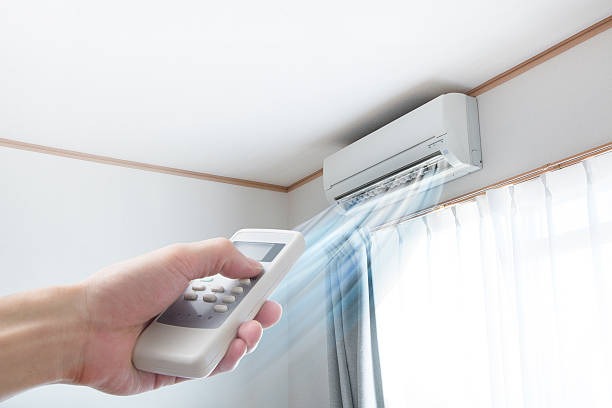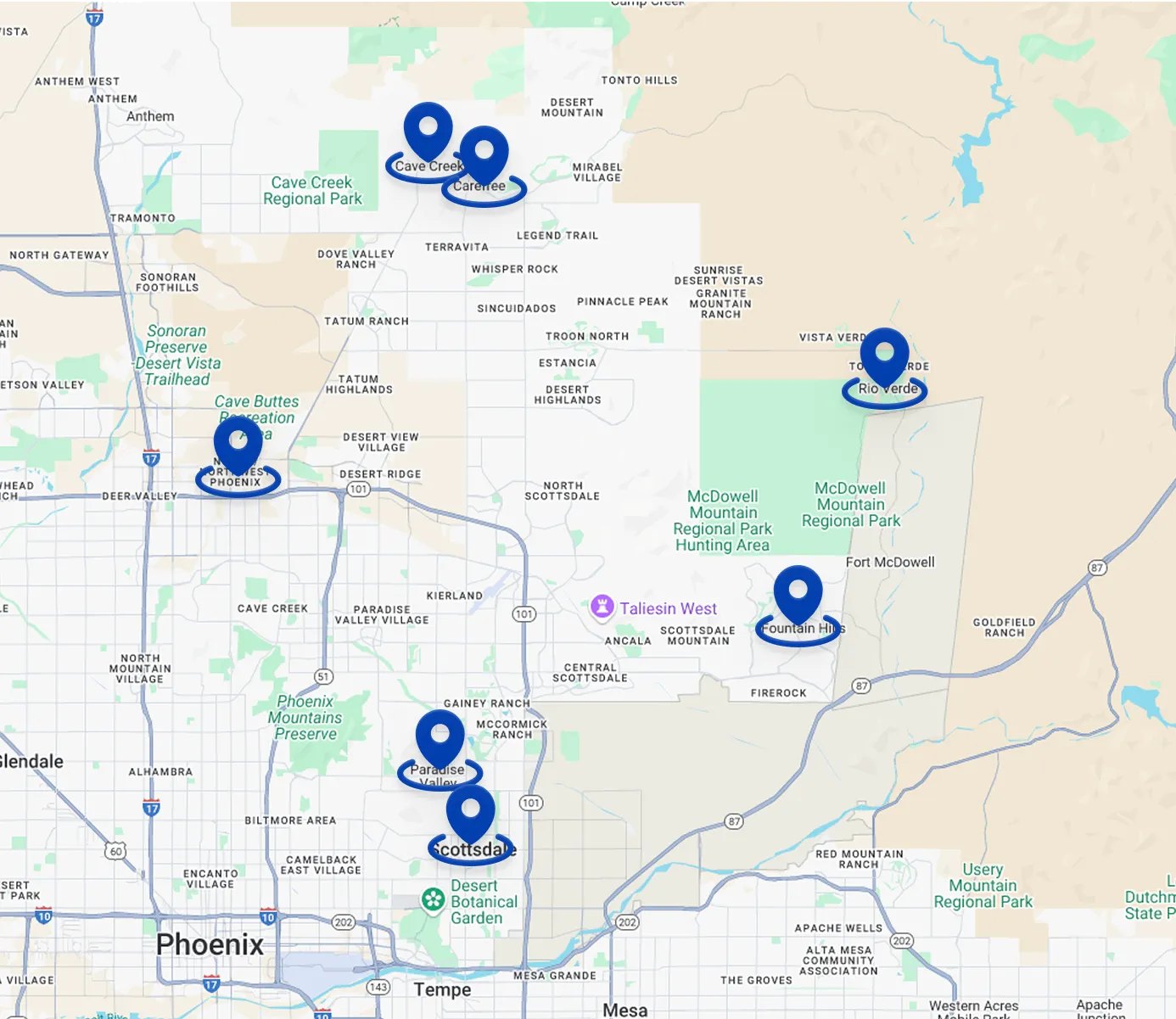Mini-split AC in Paradise Valley, AZ
Ductless mini-split systems are a highly effective way to bring targeted, efficient cooling and heating to Paradise Valley homes without the cost and disruption of new ductwork. For homeowners dealing with rising energy bills, uneven rooms, additions, guest casitas, or historic properties that cannot accommodate ducts, a mini-split AC delivers zoned comfort, improved energy performance, and quieter operation.

What is a ductless mini-split system and why it matters in Paradise Valley
A mini-split pairs an outdoor compressor/condenser with one or more indoor air handlers mounted on walls, ceilings, or floors. Each indoor unit is controlled independently so you can set different temperatures by room or zone. In Paradise Valley, where summers bring extended high temperatures and homes often have large glass exposures and high ceilings, mini-splits:
- Reduce hot and cold spots with precise zone control
- Improve energy efficiency with inverter-driven compressors
- Eliminate energy losses tied to leaky ductwork
- Offer discreet installation options for high-end or historic homes
Common mini-split AC types and use cases
- Single-zone wall-mounted units: ideal for a room without ducts such as an addition or converted garage
- Multi-zone systems: 2 to 8+ indoor heads served by one outdoor unit for whole-house zoning
- Concealed ducted mini-splits: hidden in attics or ceilings when a discreet look is needed
- Floor-replacement or ceiling cassette units: useful for rooms with limited wall space or for guest suites
Common mini-split AC issues in Paradise Valley, AZ
Understanding typical problems helps protect your investment:
- Reduced cooling performance: often due to incorrect sizing, low refrigerant, dirty coils, or outdoor unit heat load during heat waves
- Short cycling and poor humidity control: commonly from oversized units or thermostatic misconfiguration
- Frozen evaporator coil: caused by airflow restriction from dusty filters or obstructed returns during monsoon dust season
- Refrigerant leaks and electrical faults: wear-related or due to poor installation practices
- Condensate and drain issues: high humidity events can cause overflow if drain lines are not properly pitched or insulated
Site assessment and proper system sizing
A thorough on-site assessment is essential to get the right system:
- Room-by-room load calculation (Manual J) accounting for orientation, glass area, ceiling height, insulation, occupancy, and internal heat gains
- Evaluate sun exposure and shading—south and west facing rooms in Paradise Valley can need additional capacity
- Confirm electrical service capacity, breaker availability, and potential upgrades
- Determine outdoor unit location for airflow, noise management, and HOA/landscape constraints
- Plan refrigerant line routing, maximum line length, and refrigerant charge adjustments for long lines or multi-zone setups
Correct sizing matters. Oversized units cycle frequently, wasting energy and reducing humidity control. Undersized systems will struggle during heat waves. Proper sizing plus inverter technology is the best balance for Paradise Valley climates.
Product and brand options
Reputable manufacturers offer features suited for local needs:
- Day & Night: reliable, competitively featured systems built for the region
- Mitsubishi, Daikin, Fujitsu, LG, Panasonic, and Samsung: known for inverter compressors, multi-zone flexibility, and advanced controls
Key features to consider: - High SEER ratings and variable-speed inverters for efficiency during Arizona heat
- Low sound ratings for luxury neighborhoods and poolside installations
- Heat pump capability for mild winter heating needs
- Advanced filtration, humidity control, and Wi-Fi or smart thermostats
Professional installation steps and typical timeline
A professional install follows a consistent process:
- Pre-install site preparation and permit pull if required
- Mount indoor air handlers and secure outdoor condenser with proper pad or bracket
- Run refrigerant lines, electrical conduit, and condensate drain with correct insulation and pitch
- Evacuate lines, charge refrigerant, and perform leak testing and pressure checks
- Commission system, configure controls, and verify performance in each zone
- Final inspection and documentation for warranty registration
Typical timeline: single-zone installs can often be completed within a day; multi-zone systems usually require 1 to 3 days depending on complexity and permit processing.
Common repair and replacement scenarios
Repairs frequently encountered:
- Refrigerant leaks and associated recharging and leak repair
- Compressor or inverter board failures on older units
- Fan motor and capacitor replacements
- Control board or sensor malfunctions
Replacement becomes advisable when: - Units are beyond 10 to 15 years of age and parts availability is limited
- Energy bills are rising and repairs are frequent
- Performance cannot meet cooling loads during peak summer
Maintenance and tune-up plans
Annual maintenance is important in Paradise Valley to preserve efficiency:
- Clean or replace filters and inspect indoor coils and drain pans
- Check refrigerant levels and electrical connections
- Verify outdoor unit clearance and clean condenser coils of dust and debris
- Test controls, thermostats, and zone balancing
Maintenance plans typically include scheduled visits, a performance checklist, priority service, and seasonal tune-ups to prepare for summer demand.
Warranties, financing and promotional options
- Manufacturer warranties often include varying coverage for compressor and parts (example ranges typically span multiple years depending on brand)
- Labor warranties from installers vary; extended labor protection may be available
- Financing options may be offered through lenders such as Synchrony and Wells Fargo with promotional programs available for qualified buyers to spread payments over time
Check specific equipment and installer documentation for exact warranty terms and any available promotional financing programs that match your needs.
Pricing considerations and typical deliverables
Factors that influence total cost:
- Number of zones and total capacity required
- Brand and model selected, including inverter and filtration options
- Complexity of installation: wall mounts, concealed units, long line-sets, electrical upgrades, or structural work
- Permit and inspection fees, HOA approvals, and landscaping restoration
Typical deliverables on installation projects: - Written estimate with equipment specifications and performance ratings
- Manual J load calculation and system layout
- Permit filings and final inspection confirmation
- Installation photos, warranty registration paperwork, and homeowner operation demo
- Maintenance plan options and service documentation
Scheduling service with a licensed, insured technician in Paradise Valley
Scheduling should begin with an on-site assessment performed by a licensed, insured technician who will:
- Verify local permitting and HOA requirements
- Complete the load calculation and present equipment and zoning options in writing
- Provide a clear installation timeline and a comprehensive written estimate including deliverables and warranty terms
Look for technicians with state licensing, proof of insurance, local experience handling Paradise Valley home styles, and the ability to coordinate permits and inspections for a seamless installation.
Mini-split AC systems offer a flexible, efficient solution for Paradise Valley homes that need targeted comfort, reduced energy use, and a less intrusive installation. With proper site assessment, right-sized equipment, and professional installation and maintenance, a ductless system can deliver reliable comfort through the long Arizona cooling season and beyond.
Customer Testimonials
Hear directly from our customers about the quality, honesty, and care we bring to every job.










